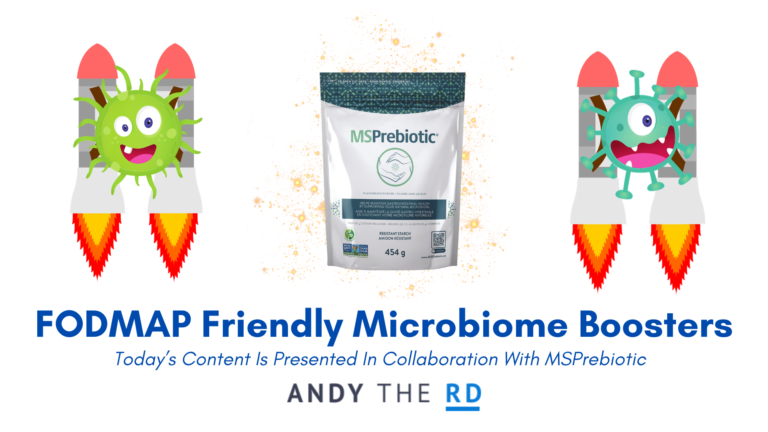FODMAPs are a family of food ingredients that are poorly absorbed in the small intestine and generally end up being fermented in the colon by our gut bacteria.
Their ability to ferment positively contributes to the gut microbiome, but can also cause digestive distress in certain populations—which is why the strategic use of a low-FODMAP diet to determine specific sensitivity to these compounds is a primary management strategy for IBS.
Prolonged or inappropriate use of low-FODMAP food or the need to avoid or minimize many different types of FODMAP-containing foods could negatively affect the gut microbiome.
With that in mind, I partnered with the manufacturer of resistant starch MSPrebiotic to share FODMAP-friendly strategies that will boost your healthy gut bacteria.
Let’s get to the good stuff.
FODMAPs & The Gut Microbiome
In 2022 the American Journal of Clinical Nutrition conducted a systematic review and meta-analysis of relevant studies examining the effects of a low-FODMAP diet on the human gut microbiome.
The prevalent finding was the reduced presence of healthy bacteria from the Bifidobacteria genus.
Bifidobacteria are among the first families of “healthy” gut bacteria that serve many important roles, including being responsible for the production of SCFAs.
SCFAs are anti-inflammatory compounds that perform multiple functions in the human body, including:
- Regulation of intestinal acidity
- Protection of the intestinal lining
- Improving insulin resistance
- Communication with the brain
- Appetite regulation, food intake
- Immune system support
- And much, much more.
Perhaps not surprisingly, studies have shown this people living with prediabetes who consume more FODMAPs they tended to have greater amounts of SCFA-producing bacteria and less insulin resistance.
So if we need to limit FODMAPs but want to reap the benefits of these incredible bacteria and the compounds they create, what can we do?
You are about to find out!
FODMAP Friendly Microbiome Strategies
While it’s true that many of the foods associated with microbiome-enhancing benefits are generally higher in FODMAPs, that’s not true of all of them.
There are many FODMAP-friendly strategies one could use to maintain healthy gut bacteria levels.
#1 Focusing on fatty fish or DHA/EPA supplements
There is a link between the intake of omega-3 fatty acids EPA/DHA and the state of the human gut microbiome.
EPA/DHA is only found in fatty fish such as salmon, sardines, trout and mackerel or through supplements; with studies showing that they can boost levels of various types of healthy bacteria, including Bifidobacteria.
If you don’t consume many servings of oily fish on a weekly basis, it will be quite difficult to optimize your omega-3 levels without supplementation.
#2 Eat more low-FODMAP polyphenols
Polyphenols are a family of antioxidant compounds that Scientists increasingly believe that they affect our microbiomeespecially with reinforcement Bifiobacteria.
They’re generally found in foods that are otherwise super healthy, so you can’t go wrong here.
The best examples include dark chocolate, flaxseed, black olives, pecans, strawberries, blackberries, tempeh, spinach, green tea, and broccoli.
#3 Resistant Starch Supplement
Resistant starch, as the name suggests, is resistant to digestion until it is fermented by our gut bacteria.
As a result, not all types of resistant starch are considered FODMAP friendly.
Foods with FODMAP-friendly resistant starch include oats, green bananas and rice/potatoes that have been cooked and cooled.
The type of resistant starch provided by MSPrebiotic, in recommended serving sizes, is also FODMAP friendly.
And why does this matter?
MSPrebiotic has been proven in human studies to increase levels of Bifidobacteriathe same family of gut bacteria that could be reduced on a low-FODMAP diet.
Let’s take a closer look at this exciting product.
An introduction to MSPrebiotic
MSPrebiotic is an easy-to-use and FODMAP-friendly prebiotic fiber supplement that has real potential to contribute to improvements in many areas of your health, including strengthening your gut microbiome as well as combating insulin resistance and related concerns.
The product is available as a flavorless powder that can be added to smoothies, oatmeal, yogurt and any other cool drinks or foods.
I work with MSPrebiotic because I see it as a free, evidence-based tool that can play an important role in improving your health.
This is especially true for the simple reason that many people do not have access to very resistant starch in their diet and thus would enjoy significant benefits through its use.
Did today’s post resonate with you?
MSPrebiotic was kind enough to offer my readers a discount code, which you can find below:
ANDYRDOS with a 15% discount until December 31St and NEW2MSP for Free Shipping on your first order (use together!).
Andy De Santis RD MPH
